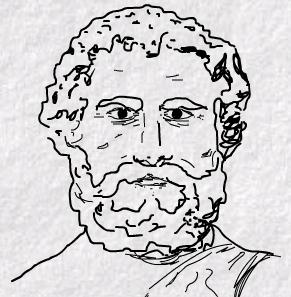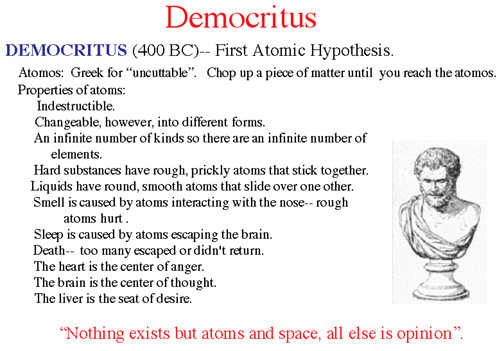- Democritus Atomic Theory Experiment
- Democritus Atomic Model Name
- Democritus Atomism
- When Did Democritus Make His Discovery
Democritus was an ancient Greek philosopher who was very interested in matter. He wanted to know what things are actually made of. He was the person who developed the idea of atoms. The word atom comes from the Greek word atomos which means 'uncuttable.'
- The idea of the atom goes as far back as the ancient Greek philosopher Democritus in about 400 B.C.E.
- This led to his “theory of eidôla” to explain how our minds create the illusion of reality.
- Democritus was one of the first determinists, arguing that a world made only of atoms and controlled by the laws of physics left no room for free will.
Here comes the old version of an Atom. Is an atom really indivisible as asserted by Democritus and Dalton? Stay tuned on further hearings from Lord Rutherfor. Democritus Although little is known of his life, quite a lot is known of his physics and philosophy. Certainly Democritus was not the first to propose an atomic theory. Traces of an atomic theory go back further than this, perhaps to the Pythagorean notion of the regular solids playing a fundamental role in the makeup of the universe.
Philosophers love “The Matrix”.

It’s the perfect introduction to the ideas of big names such as Plato and Descartes but with leather trench coats, bullet time, and a brooding Keanu Reeves. One of the most memorable moments in the movie comes near the end when the protagonist, Neo, finally understands the Matrix for the illusionary simulation that it is. Now, he can see the numbers underpinning everything. He can see the source code of the world.
Democritus Atomic Theory Experiment
With only the slightest of modifications, Neo’s epiphany is no science fiction at all. This is how the world is made. But, where Neo saw green, floating numbers, we now know the universe is actually made up of tiny, imperceptible objects. Rather than code, we have atoms—the building blocks of everything there is, ever was, and ever will be.
We know atoms exist thanks to scientists and electron microscopes, but the idea goes much further back than that. It goes back to the ancient Greeks. Their output was prodigious. Almost every discipline you can study, the Greeks turned their minds to first . Pythagoras laid the foundation for math and geometry, Aristotle contemplated biology and physics, Plato thought about governance, Herodotus was a historian, and Hippocrates gave doctors his eponymous oath. But one of the most ingenious “firsts” must come with the atomists, like Democritus or Epicurus.
It’s odd to think that millennia ago, a few bearded men in togas, strolling around a sun-bleached agora, used philosophy to establish the fundamental fabric of the universe.
Although the idea of “the atom” had been floating around the Peloponnese for a while, Democritus was the first to articulate it fully. He argued that atoms must exist because the alternative is sheer nonsense. If we could constantly divide or cut a thing into two then we would go on forever. We’d get smaller and smaller all the way to infinity, and there’d be no end point. But the universe can’t be built without foundations. Nothing can come from nothing. So, there must be a fundamental unit to the world from which everything else is made, and for this, Democritus coined the term “atom” (which literally means uncuttable, although 20th Century scientists learned how to split one, rather ruining the definition).
The question now facing Democritus was how these basic, imperceptible atoms came to make the objects we all see, touch, and love. He noted how, when we look at the world around us, we can see it constantly changing, shifting, dying, and growing. The world flows. So atoms, which make up everything there is, must themselves be moving. They can’t just be inert or still.
Democritus argued that atoms come together in various combinations, and then emit something called an “eidôla.” These composite blobs of atoms radiate eidôla outward, like ripples in water. The eidôla are then picked up by us as the subjective experiencer and we translate this atomic radiation into ideas or sensations.
Democritus thought that atoms emit an “eidôla” that we perceive as sensations.Jonny Thomson

For example, let’s imagine a group of atoms come together and, with a special wiggle, emit their eidôla. This flies through the space (or “void,” as Democritus called it) to our eyes. Our eyes then whizz this eidôla along to our understanding, where it’s converted into “blue” or “round” or “big.”
There were two big implications to Democritus’ theory.
First, the world as we know it doesn’t actually exist. Just like the code in the Matrix, the world is really just incomprehensible atoms. Our minds create “reality” out of these atoms, and everything is just an illusion we play on ourselves.
Second, the world is entirely made up of atoms. The tree outside, your pet turtle, your feeling of love, and even the mind that processes eidôla are all made up of atoms.
The upshot of this is that Democritus was one of the first “determinists” in that he thought there could be no free will or choice. We’re all just marbles, bouncing around to the laws of physics.
We might think this a pretty depressing place to finish, yet Democritus was actually known as “the laughing philosopher.” He simply refused to take anything seriously. If reality was ultimately the invented story of our minds, and the universe was just physical laws, what’s the point in getting wound up by things? Why stress about that email from your boss, or that mean thing a friend said when there’s nothing we can do anyway? If the world is an illusion, and a boringly scripted one at that, why not laugh?
The first “atomist,” Democritus, of course got a lot wrong, but it’s remarkable how much he got right. By reflecting on reality long enough, he came to conclusions that scientists proved millennia later. If nothing else, he offers a shining example of the power of contemplation.
Jonny Thomson teaches philosophy in Oxford. He runs a popular Instagram account called Mini Philosophy (@philosophyminis). His first book is Mini Philosophy: A Small Book of Big Ideas.
From Your Site Articles
Related Articles Around the Web
Source link
Learning Objectives
- Describe how the Greek philosophers approached nature.
- Describe the discussion about matter.
- Describe the contribution Democritus made to our understanding of matter.
What would the philosophers do?
People enjoy getting together to discuss things, whether it is how your favorite sports team is doing, what the best new movie is, the current politics, or any number of other topics. Often the question is raised about who is right and who is wrong. If the football game is to be played this coming weekend, all we can do is offer opinions as to its outcome. The game has not been played yet, so we don’t know who will actually win.
Democritus Atomic Model Name
The ancient Greek philosophers did a lot of discussing, with part of their conversations concerning the physical world and its composition. There were different opinions about what made up matter. Some felt one thing was true while others believed another set of ideas. Since these scholars did not have laboratories and had not developed the idea of the experiment, they were left to debate. Whoever could offer the best argument was considered right. However, often the best argument had little to do with reality.
Figure 1. Into how small of pieces can you divide a grain of sand?
One of the on-going debates had to do with sand. The question posed was: into how small of pieces can you divide a grain of sand? The prevailing thought at the time, pushed by Aristotle, was that the grain of sand could be divided indefinitely, that you could always get a smaller particle by dividing a larger one and there was no limit to how small the resulting particle could be.
Since Aristotle was such an influential philosopher, very few people disagreed with him. However, there were some philosophers who believed that there was a limit to how small a grain of sand could be divided. One of these philosophers was Democritus (c. 460–370 BCE), often referred to as the “laughing philosopher” because of his emphasis on cheerfulness. He taught that there were substances called atoms and that these atoms made up all material things. The atoms were unchangeable, indestructible, and always existed.
The word “atom” comes from the Greek atomos and means “indivisible.” The atomists of the time (Democritus being one of the leading atomists) believed there were two realities that made up the physical world: atoms and void. There was an infinite number of atoms, but different types of atoms had different sizes and shapes. The void was the empty space in which the atoms moved and collided with one another. When these atoms collided with one another, they might repel each other or they might connect in clusters, held together by tiny hooks and barbs on the surface of the atoms.
Aristotle disagreed with Democritus and offered his own idea of the composition of matter. According to Aristotle, everything was composed of four elements: earth, air, fire, and water. The theory of Democritus explained things better, but Aristotle was more influential, so his ideas prevailed. We had to wait almost two thousand years before scientists came around to seeing the atom as Democritus did.
How right was Democritus?
Democritus Atomism
It is very interesting that Democritus had the basic idea of atoms, even though he had no experimental evidence to support his thinking. We now know more about how atoms hold together in “clusters” (compounds), but the basic concept existed over two thousand years ago. We also know that atoms can be further subdivided, but there is still a lower limit to how small we can break up that grain of sand.
Summary

When Did Democritus Make His Discovery
- Greek philosophers debated about many things.
- Aristotle and others believed that a grain of sand could be divided indefinitely.
- Democritus believed there was a lower limit to the dividing of a grain of sand.
Practice
Use the link below to answer the following questions:
- Who influenced the thinking of Democritus?
- Who were the atomists?
- How did Democritus explain how we saw objects?
- What type of atom did Democritus believe the soul was composed of?

Review
- How did the ancient Greek philosophers spend their time?
- What approach did they not have for studying nature?
- Who was the most influential philosopher of that time?
- What was the major contribution Democritus made to the thinking of his day?
- List characteristics of atoms according to Democritus.
Glossary
- philosopher: People who do a lot of discussing and debate, with part of their conversations concerning the physical world and its composition.
- atom: The philosopher Democritus (c. 460–370 BCE), taught that there were substances called atoms and that these atoms made up all material things. The atoms were unchangeable, indestructible, and always existed.
References
- (WT-shared) Shoestring. http://commons.wikimedia.org/wiki/File:Public_beach_Mont_Choisy.JPG.
- Antoine Coypel. http://commons.wikimedia.org/wiki/File:Coypel_Democritus.jpg.
